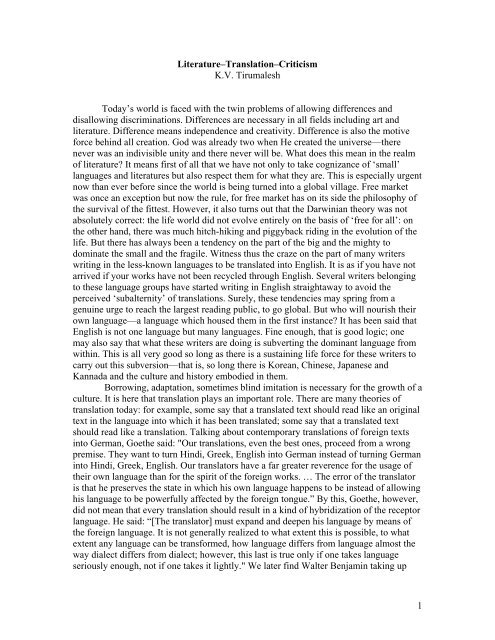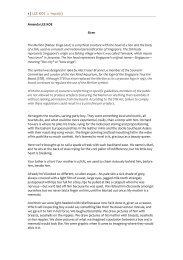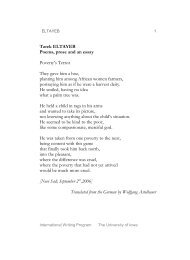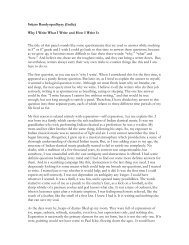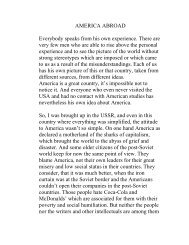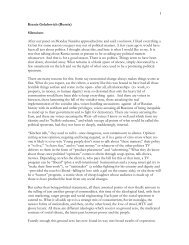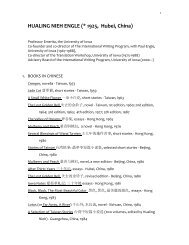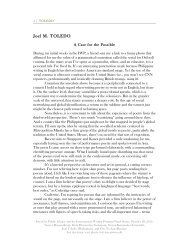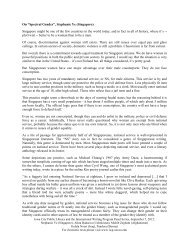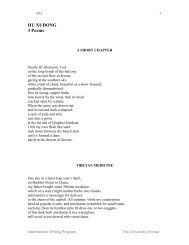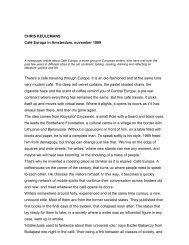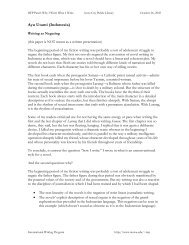LiteratureâTranslationâCriticism K.V. Tirumalesh Today's world is ...
LiteratureâTranslationâCriticism K.V. Tirumalesh Today's world is ...
LiteratureâTranslationâCriticism K.V. Tirumalesh Today's world is ...
Create successful ePaper yourself
Turn your PDF publications into a flip-book with our unique Google optimized e-Paper software.
Literature–Translation–Critic<strong>is</strong>m<br />
K.V. <strong>Tirumalesh</strong><br />
Today’s <strong>world</strong> <strong>is</strong> faced with the twin problems of allowing differences and<br />
d<strong>is</strong>allowing d<strong>is</strong>criminations. Differences are necessary in all fields including art and<br />
literature. Difference means independence and creativity. Difference <strong>is</strong> also the motive<br />
force behind all creation. God was already two when He created the universe—there<br />
never was an indiv<strong>is</strong>ible unity and there never will be. What does th<strong>is</strong> mean in the realm<br />
of literature It means first of all that we have not only to take cognizance of ‘small’<br />
languages and literatures but also respect them for what they are. Th<strong>is</strong> <strong>is</strong> especially urgent<br />
now than ever before since the <strong>world</strong> <strong>is</strong> being turned into a global village. Free market<br />
was once an exception but now the rule, for free market has on its side the philosophy of<br />
the survival of the fittest. However, it also turns out that the Darwinian theory was not<br />
absolutely correct: the life <strong>world</strong> did not evolve entirely on the bas<strong>is</strong> of ‘free for all’: on<br />
the other hand, there was much hitch-hiking and piggyback riding in the evolution of the<br />
life. But there has always been a tendency on the part of the big and the mighty to<br />
dominate the small and the fragile. Witness thus the craze on the part of many writers<br />
writing in the less-known languages to be translated into Engl<strong>is</strong>h. It <strong>is</strong> as if you have not<br />
arrived if your works have not been recycled through Engl<strong>is</strong>h. Several writers belonging<br />
to these language groups have started writing in Engl<strong>is</strong>h straightaway to avoid the<br />
perceived ‘subalternity’ of translations. Surely, these tendencies may spring from a<br />
genuine urge to reach the largest reading public, to go global. But who will nour<strong>is</strong>h their<br />
own language—a language which housed them in the first instance It has been said that<br />
Engl<strong>is</strong>h <strong>is</strong> not one language but many languages. Fine enough, that <strong>is</strong> good logic; one<br />
may also say that what these writers are doing <strong>is</strong> subverting the dominant language from<br />
within. Th<strong>is</strong> <strong>is</strong> all very good so long as there <strong>is</strong> a sustaining life force for these writers to<br />
carry out th<strong>is</strong> subversion—that <strong>is</strong>, so long there <strong>is</strong> Korean, Chinese, Japanese and<br />
Kannada and the culture and h<strong>is</strong>tory embodied in them.<br />
Borrowing, adaptation, sometimes blind imitation <strong>is</strong> necessary for the growth of a<br />
culture. It <strong>is</strong> here that translation plays an important role. There are many theories of<br />
translation today: for example, some say that a translated text should read like an original<br />
text in the language into which it has been translated; some say that a translated text<br />
should read like a translation. Talking about contemporary translations of foreign texts<br />
into German, Goethe said: "Our translations, even the best ones, proceed from a wrong<br />
prem<strong>is</strong>e. They want to turn Hindi, Greek, Engl<strong>is</strong>h into German instead of turning German<br />
into Hindi, Greek, Engl<strong>is</strong>h. Our translators have a far greater reverence for the usage of<br />
their own language than for the spirit of the foreign works. … The error of the translator<br />
<strong>is</strong> that he preserves the state in which h<strong>is</strong> own language happens to be instead of allowing<br />
h<strong>is</strong> language to be powerfully affected by the foreign tongue.” By th<strong>is</strong>, Goethe, however,<br />
did not mean that every translation should result in a kind of hybridization of the receptor<br />
language. He said: “[The translator] must expand and deepen h<strong>is</strong> language by means of<br />
the foreign language. It <strong>is</strong> not generally realized to what extent th<strong>is</strong> <strong>is</strong> possible, to what<br />
extent any language can be transformed, how language differs from language almost the<br />
way dialect differs from dialect; however, th<strong>is</strong> last <strong>is</strong> true only if one takes language<br />
seriously enough, not if one takes it lightly." We later find Walter Benjamin taking up<br />
1
th<strong>is</strong> idea seriously enough in h<strong>is</strong> essay “The Task of the Translator.” He too appeals to<br />
the notion of a primordial language; translation, according to him, can make a language<br />
to go back to th<strong>is</strong> primordiality to rejuvenate itself. Indeed, as current theories of<br />
translation have shown, it <strong>is</strong> difficult to lay down any rule for translation; one has to<br />
accept the fact that when cultural variables and contingencies are so many, translation<br />
cannot but be multifarious. What <strong>is</strong> important <strong>is</strong> the interest in the other and all<br />
translations stem from that basic fact. Often, translation may be based on a m<strong>is</strong>reading of<br />
the original text but it still can have a galvanizing effect on the language.<br />
But cultural contact <strong>is</strong> also basically corrosive: a dominant culture may just<br />
gobble up a small culture. The example from language contact may be illustrative. It <strong>is</strong><br />
said that bilingual<strong>is</strong>m <strong>is</strong> the first step towards hara-kiri. When the native speakers of a<br />
small language come into contact with a dominant language, especially the language of<br />
the colonizers, the speakers learn the new language of power, become bilingual, develop<br />
an inferiority complex about their own language, use it less and less, force their children<br />
to learn the language of the masters and let their native language die. Not only the<br />
languages of the masters but also their religion, food, dress and such other practices<br />
become the model to follow. Translation from a dominant language to a subordinate one<br />
always has th<strong>is</strong> r<strong>is</strong>k, but the r<strong>is</strong>k has to be taken. There <strong>is</strong> no other way.<br />
Just like language, literature too works at multiple levels: we talk about universal<br />
language, Chomsky’s Universal Grammar, which <strong>is</strong> a defining feature of humanity<br />
without reference to race, creed and culture. There are also languages and their dialects.<br />
Nobody speaks a universal language, not even a language but only a dialect or an<br />
idiolect. Similarly, we talk about World Literature, but nobody writes or reads World<br />
Literature; we write and read regional literatures only. What then <strong>is</strong> th<strong>is</strong> relationship<br />
between universality and locality Seamus Heaney says that every poet has double<br />
citizenship—he <strong>is</strong> a citizen of h<strong>is</strong> locality as well as a citizen of conscience. When one<br />
enters literature, one enters these two realms simultaneously. You cannot be in one<br />
without at the same time being in the other.<br />
Literature today <strong>is</strong> a much contested field. Some years ago one could safely say<br />
what <strong>is</strong> meant by literature but today it <strong>is</strong> everything or nothing. Th<strong>is</strong> <strong>is</strong> mainly because<br />
of the inexorable advancement of Literary Theory—which in itself <strong>is</strong> an agon<strong>is</strong>tic realm<br />
of conceptual frameworks. It <strong>is</strong> common knowledge now that books of critic<strong>is</strong>m sell<br />
better than poetry and many writers are d<strong>is</strong>mayed by th<strong>is</strong>. Certainly Theory holds a<br />
fascination for many young people. Creative writers are piqued by the fact that a<br />
‘secondary’ and ‘parasitical’ mode should steal a march over a ‘primary’ and<br />
‘autonomous’ mode like poetry. But th<strong>is</strong> <strong>is</strong> a m<strong>is</strong>taken notion; theory or literary critic<strong>is</strong>m<br />
in general <strong>is</strong> neither ‘secondary’ nor ‘parasitical.’ Furthermore, there <strong>is</strong> nothing ‘primary’<br />
or ‘autonomous’ about poetry or such other creative works: both take their sap from life.<br />
Critic<strong>is</strong>m <strong>is</strong> at best conjunctive to literary works.<br />
And yet, the fascination of critic<strong>is</strong>m needs to be explained. Why do more people<br />
read critic<strong>is</strong>m than literary works The reason may be the indirect mode of literary works.<br />
Readers are often baffled by th<strong>is</strong> indirection. Literary works do not seem to talk to them;<br />
they see their formal aspects but are not sure about their meaning. Readers generally have<br />
an affective relationship towards creative works but are unable to have a communicative<br />
dialogue. Th<strong>is</strong> <strong>is</strong> the very space of literary critic<strong>is</strong>m in all its forms; for it seems to be the<br />
voice of literature.<br />
2
Literary works stand at an angle to the <strong>world</strong>—as E. M. Forster says of Cavafy,<br />
the great Greek poet. Not even critic<strong>is</strong>m can look at a creative work squarely—it can only<br />
hypothesize about it. There <strong>is</strong> a beautiful poem by Rilke called “Orpheus–Hermes–<br />
Eurydice.” The poem takes as its theme the well known myth of Orpheus’ second loss of<br />
h<strong>is</strong> beloved wife Eurydice as he d<strong>is</strong>obeys the command that he should not look at her<br />
before reaching the earth. What <strong>is</strong> strikingly beautiful about Rilke’s poem <strong>is</strong> the way he<br />
describes the whole scenario—as if the process of the coming of Eurydice <strong>is</strong> nothing but<br />
the creative process itself. Eurydice has only a very vague memory of her past; she could<br />
not even recognize her husband; she <strong>is</strong> fragile and ethereal—in a sense primordial. By<br />
turning back to look at her, the whole v<strong>is</strong>ion <strong>is</strong> lost for Orpheus: she returns to where she<br />
came from. There <strong>is</strong> a profound sense of grief in the poem—which <strong>is</strong> not described<br />
directly. Literature in general and poetry in particular <strong>is</strong> like that: it doesn’t stand direct<br />
gaze.<br />
3


